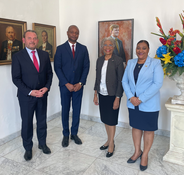On Wednesday, 30 November 2022, the Ombuds institutions of the Kingdom of the Netherlands met in Curaçao for their annual meeting. The kingdom of the Netherlands consists of four countries: Aruba, Curacao, Sint Maarten and the Netherlands that besides the European part also includes three islands in the Caribbean. The annual meeting was preceded by a conference with the theme poverty organized by the Ombudsman of Curaçao, Keursly Concincion, in collaboration with his colleagues from Sint Maarten and the Netherlands, who all currently serve on the IOI Board of Directors. The conference was the outcome of several round tables the three Ombuds institutions had organised in their respective territories. Participants of these round tables were stakeholders that are confronted with the poverty that exists in the Caribbean part of the Kingdom. The focus was not only on adults but also children. The Ombudsman of Curaçao hopes to have a Children's Ombudsman appointed to his office in the new year. For this reason, the Children's Ombudsman of the Netherlands, Margrite Kalverboer, was also present.
The conference was opened by the Minister of Social Development, Labour and Welfare, Ruthmilda Larmonie-Cecilia. Although Aruba (the fourth constituent state in the Kingdom of the Netherlands) does not yet have an Ombudsman office, they were represented in the person of the Dean of the University of Aruba who gave a presentation on some of Aruba’s challenges. The citizens of Aruba were therefore also indirectly represented.
The round table that was previously organised in Sint Maarten by the Ombudsman, Gwendolien Mossel, in preparation for the conference had focused on the central question: ‘what type of data is required, to influence proper decision-making on poverty?’ Various reports produced by the Ombudsman, as well as a recent decision of the Constitutional Court, had concluded that that government was lacking data, which contributed to inter alia a poverty line not being established. Having properly functioning and adequately resourced statistical organisations are therefore paramount as a critical first step in eradicating poverty.
The National Ombudsman, Reinier van Zutphen, in cooperation with the Children's Ombudsman, presented the outcome of three reports that were conducted on poverty. The first report dealt with poverty of elderly persons, the second was on poverty amongst the youth and the final report was on single parent families. It is clear from these, but also from the other presentations during the conference, that poverty is never solely a financial issue. The reason people are living in poverty can be because of an extremely low income (working poor), or having health issues and not sufficient financial backup because of an insufficient social safety net and limited savings.
The conference closed with six action points that will be picked up by the Ombudsman and will be presented to their respective governments. The six points are:
- Addressing the language challenges
- Debt relief assistance
- Improved social safety net
- Access to Education for all children
- Free legal counter (assistance)
- Elderly (care)
During their meeting the three Ombudsmen also discussed the existing problems the countries face with the presence of the undocumented immigrants. Most of these persons come from Venezuela and are people who want to earn a living in order to relieve the poverty in their home country.
As there is a great need for their labour, they find work but are often exploited or work for very low wages. This and other topics were extensively discussed. After their meeting the three Ombudsmen met with her Excellency the Governor of Curaçao and the Minister of Justice.
Source: The National Ombudsman of the Netherlands

